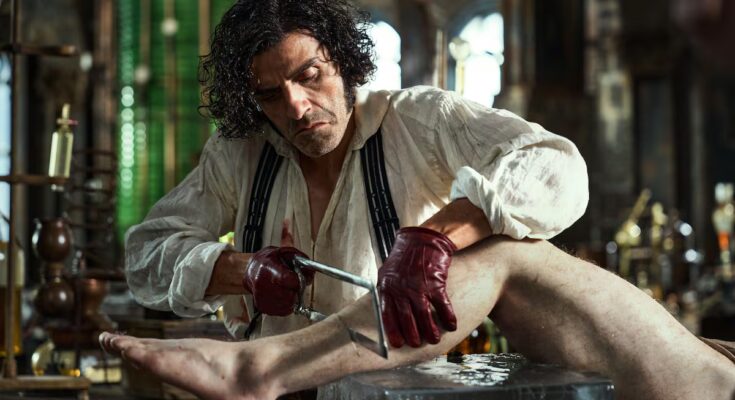Before the most awaited dish, the very beautiful one FrankensteinI gulp down an aperitif that always moves me. AND Cider House Rules and as always, I am moved when the wonderful Michael Caine, that abortion doctor, addicted to ether and sex with his nurse, greets the nights of those discarded children, hungry for adoption or love, with these words: “Sleep well, princes of Maine, kings of New England”. These kids watch the same film every week, the only one they have available. AND king kong. And they remain enraptured, even if they know it by heart.
And then I go and watch a film on television designed to be enjoyed at the cinema, with spectacular images and sounds. The transfer doesn’t matter. Netflix is guaranteed an immense customer base. And the richest can also afford to finance great artists from time to time, works that may clash with the tastes of an audience accustomed to other movements that entertain them immensely. It’s titled Frankenstein. When I think of its creator, the formidable Guillermo del Toro, I perhaps capriciously associate him with a song by the sentimental volcano of Belfast, the immortal Van Morrison, in which he assures: “No one will steal my dreams on days like these”. Del Toro has always had many dreams that he has fulfilled, linked to fantasy, to poetic terror, to imagination, to the myths of a tradition that can disturb the mind and heart. His films are very expensive, but he manages to find financing. Bless this.
The creator of Pan’s Labyrinth AND The shape of water He has finally managed to recreate a myth that has continually haunted him
. It is the story of the obsessive and abysmal Doctor Frankenstein and the creature he created with shreds of corpses. In the first part you imagine an identifiable visual paradise, astonishing sets, a feverish tone, a ship stranded in Antarctica and a life-or-death struggle between the diabolical creator and his pathetic victim. Del Toro causes the spectator’s hypnosis from the beginning. He is telling the story of Doctor Frankenstein.
But in the second part, which offers the testimony of the monster, always cornered and more alone than ever, everything moves me. There are moments when tears come to my eyes. And ever since I read Mary Shelley’s story or saw the different movie versions of Frankenstein, I have been haunted by something I believe I heard from the monster or made up: “If I’m bad, it’s because I’m unhappy.” And may happy people, with their nuances, enjoy that state for a long time.



